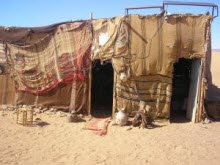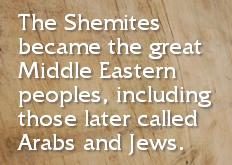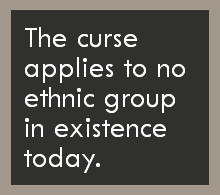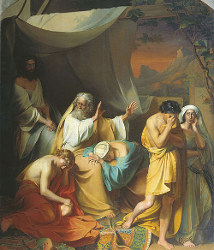My Three Sons - Japheth and the Gentiles
 (Read Part 1: My Three Sons, Part 2: Canaan and the Curse, Part 3: Shem and the Savior.)
(Read Part 1: My Three Sons, Part 2: Canaan and the Curse, Part 3: Shem and the Savior.)
“May God enlarge Japhet, and let him dwell in the tents of Shem, and let Canaan be his servant” (ESV, Gen. 9:27).
The last of Noah’s prophecies concerns Japheth and his descendants. According to Genesis 10:2-5 Japheth’s sons included Gomer, Magog, Javan and Meshech—names familiar to Biblical readers as describing those tribes which settled in areas that would later be called Eastern Europe and Russia. “From these the coastland peoples of the Gentiles were separated into their lands, everyone according to his language, according to their families, into their nations” (Gen. 10:5, NKJV). An anthropologist would refer to Japheth’s descendants as the Indo-European peoples. What was the prophetic blessing? According to Genesis 9:27, they would be “enlarged.” This must refer to territorial and temporal enlargement—exactly what took place in the later history of the Indo-European peoples and their culture. Who can doubt that much of the world’s exploration as well as creative culture appeared among Japheth’s descendants?
Discussion
My Three Sons - Shem and the Savior
 This post continues a series examining the prophecy of Genesis 9:25-27 and the three sons of Noah. “My Three Sons” introduced the passage and its setting; “Canaan and the Curse” focused on Noah’s prophetic curse on Canaan, the son of Ham.
This post continues a series examining the prophecy of Genesis 9:25-27 and the three sons of Noah. “My Three Sons” introduced the passage and its setting; “Canaan and the Curse” focused on Noah’s prophetic curse on Canaan, the son of Ham.
“He also said, ‘Blessed be the LORD, the God of Shem; and let Canaan be his servant’ ” (ESV, Gen. 9:26).
Leaving the prophetic curse, Noah began to issue two “blessings”—a spiritual blessing on Shem and a temporal blessing on Japheth. Actually, it was not Shem himself who was blessed, but He who would eventually be the God of Shem (i.e., the LORD). Our English versions indicate by the four capital letters of LORD that the word used for God’s name is the sacred personal name sometimes translated “Jehovah,” but probably more accurately pronounced “Yahweh.” It is God’s covenant name, indicating His eternal existence and His personal relationship to His covenant people. It is the LORD (i.e., Yahweh) who would be the God of Shem and his descendants. The Shemites became the great Middle Eastern peoples, including those later called Arabs and Jews. What this prophecy indicates, therefore, is that God would establish a personal covenant relationship with the line of Shem.
Discussion
My Three Sons - Canaan and the Curse
 Read Part 1.
Read Part 1.
Discussion
My Three Sons
The deluge had passed, and the ark had been parked. It was now time for Noah and his family to enter into the postdiluvian “brave new world” that awaited them. Noah’s first act after debarkation was to build an altar and offer sacrifices to the Lord. This act elicited God’s promise that He would not smite every living thing again as He had done (Gen. 8:20-22).
The Lord then established a “covenant” with Noah and his descendants (9:9). Since we all are his descendants, the regulations of this covenant apply to all of mankind. The Jewish tradition states that the Noahic Covenant illustrates what God expects of all people, not just the Jews. The provisions of the Noahic Covenant regarding the spread of life, the source of life and the sanctity of life are given in Genesis 9:1-7. God pledged His faithfulness to these promises by the token of a “bow in the cloud” (Gen. 9:12-17). As a warrior or hunter hangs up his bow after using it, the LORD placed His bow in the sky after He shot it at the earth with the flood. By this sign, He promised that He would not perform that same act again!
Noah’s three sons—Shem, Ham and Japheth—became the progenitors of new life on an earth that had been wrecked by the flood but also purified from its ungodly inhabitants (Gen. 6:7). As the sons are mentioned in the text, Genesis 9:18 records a tiny piece of information that is important in understanding the rest of the account: “Ham was the father of Canaan.”
The following verses (9:20-27) record a sad event in the life of Noah, the man of whom it had been said, “Noah was a righteous man, blameless in his generation. Noah walked with God” (Gen 6:9). These verses describe the fall of a good man. “Noah began to be a man of the soil, and he planted a vineyard. He drank of the wine and became drunk and lay uncovered in his tent” (Gen. 9:20-21). Scripture records both the victories and the defeats of God’s people. That fact is an often overlooked evidence of the Bible’s truthfulness, since authors tend to play down the faults of their “heroes.”


Discussion